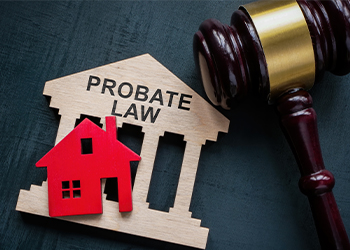How Long Do You Have to File Probate After Death?
Oct. 24, 2024
 When a loved one passes, dealing with legal formalities can be painful. If you're in this situation, our experienced probate attorney at Richard L. Vanderslice, P.C. is here to support you. Located in Philadelphia, Pennsylvania, our firm serves clients in Philadelphia County, Montgomery County, and Delaware County.
When a loved one passes, dealing with legal formalities can be painful. If you're in this situation, our experienced probate attorney at Richard L. Vanderslice, P.C. is here to support you. Located in Philadelphia, Pennsylvania, our firm serves clients in Philadelphia County, Montgomery County, and Delaware County.
With years of experience, we offer personal guidance to make complicated legal matters more manageable. Allow us to help you through the probate process and handle your loved one's estate with care and compassion.
What is Probate?
Probate is the legal process that occurs after a person’s death, ensuring their assets are distributed according to their will or state law if no will exists. This procedure validates the deceased's will, appoints an executor, and supervises the collection and distribution of the estate. The goal is to ensure that debts are paid and the remaining assets are distributed to the rightful heirs.
During probate, creditors are informed of the death and given an opportunity to make claims against the estate. Any disputes among beneficiaries are resolved under court supervision, providing a fair and transparent process for all involved parties.
Why Seek a Lawyer's Help?
Engaging a probate attorney can clarify legal matters and give you peace of mind. An experienced lawyer can streamline the probate process, reducing time and stress. They can also help avoid pitfalls that could delay proceedings or result in costly errors. At Richard L. Vanderslice, P.C., we offer tailored advice to meet your needs, guiding you through each stage of probate with confidence.
Legal jargon and paperwork can be daunting, but a knowledgeable attorney will explain the process in simple terms. Our firm provides personalized attention and guidance, so you make informed decisions. We work closely with you to honor your loved one's wishes and make the legal proceedings as seamless as possible.
How Long Do You Have to File Probate After Death?
In Pennsylvania, the probate process must be initiated promptly. The law requires filing within a reasonable timeframe, typically interpreted as soon as possible after the death. Delays can complicate matters and could result in asset mismanagement or creditor issues.
Timely probate filing preserves the estate's value, so that beneficiaries receive their rightful portion. It also provides an opportunity to address potential disputes early, reducing the risk of prolonged legal battles. We can help you determine the best time to begin and offer strategic advice to protect your interests and those of your loved ones.
Do This Before Filing for Probate
Here are a few steps that must be completed before initiating the probate process:
Gather documents: Collect all necessary documents, including the will, death certificate, financial statements, and property deeds. A probate attorney can help you determine the required documents for your case.
Identify the executor: Determine who is designated as the estate executor. The executor will be responsible for managing the probate process. In cases where no executor is named, the court will appoint someone to fulfill these duties.
Create an inventory of assets and liabilities: List the deceased's assets, such as bank accounts, real estate, and personal property, as well as any outstanding debts. This inventory helps in the smooth transition of assets and is necessary for settling the estate.
Consult with beneficiaries: Communicate with all potential beneficiaries to clarify their interests and address concerns. This could preemptively resolve conflicts and set expectations about the probate process.
Work with a probate attorney: A knowledgeable attorney can guide you through the legal requirements and offer strategic advice. They will help ensure that the executor fulfills their duties effectively and that all legal obligations are fulfilled.
The Role of an Executor in Probate
An executor is a person appointed to manage the deceased's estate throughout probate. Their responsibilities include filing necessary documentation, distributing assets, and settling any debts. Selecting a reliable executor, whether stipulated in the will or appointed by the court, is critical for a successful probate process.
Probate Laws in Pennsylvania
Pennsylvania governs probate through statutes that protect all parties involved.
Probate Court Jurisdiction
In Pennsylvania, the Orphans' Court Division is typically responsible for overseeing the probate process. This ensures the deceased's will is executed according to legal requirements and the estate is managed appropriately.
Role of Wills and Intestacy
If a valid will exists, the probate process involves verifying its authenticity and adhering to its directives. Pennsylvania's intestacy laws come into play in the absence of a will, dictating the distribution of assets among surviving relatives.
Inheritance Tax
Pennsylvania imposes an inheritance tax on property transfer from the deceased to their beneficiaries. The rate varies based on the relationship between the deceased and the beneficiary, with specific exemptions and calculations detailed under state law.
Notice to Beneficiaries and Creditors
Executors must notify all beneficiaries and potential creditors promptly. This creates transparency and allows creditors to present claims within designated timeframes, typically within one year from the decedent's death.
Simplified Probate for Small Estates
Pennsylvania offers a simplified probate procedure for estates valued below a certain threshold. This expedites the process and minimizes administrative complexities, making it more efficient for smaller estates.
Probate Attorney Serving Philadelphia, Pennsylvania
At Richard L. Vanderslice, P.C., our experienced probate attorney offers compassionate and educational legal advice to meet your needs. We support clients in Philadelphia, Montgomery County, and Delaware County, focusing on clear guidance and education. Call us to schedule a consultation today.
